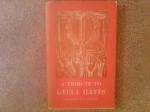|
This section contains 3,270 words (approx. 11 pages at 300 words per page) |

|
SOURCE: "Gyula Illyés: Lyric Realist," in The Hollins Critic, Vol. XXI, No. 1, February, 1984, pp. 1-12.
In the following essay, Smith shows that Illyés is a lyric realist who eschews theory and involves himself directly in the view of humanity.
I
Gyula Illyés, long considered Hungary's national poet, throughout his lifetime drew inspiration, like Bela Bartok in music, from Hungary's deepest roots. In his introduction to Once Upon a Time: Forty Hungarian Folk-Tales (1964) he says:
The Hungarian folk-tales, clothing the peasantry's confessions in pure poetry and expressing its aspirations to a higher, freer and purer life, do more than amuse us. It was over vast distances and at the cost of untold sufferings that the Hungarians reached their country. The Hungarian folk-tale—in which the heroes embark on incredible adventures, fight with dragons, and outwit the devil—has preserved, in its fairy-like language, the ancient treasures...
|
This section contains 3,270 words (approx. 11 pages at 300 words per page) |

|


